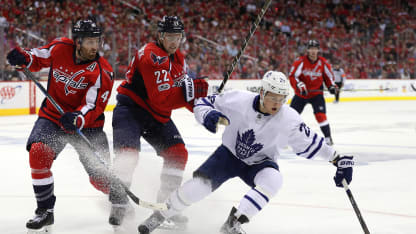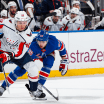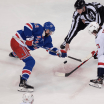Caps Aim for Better 60 Minutes in Game 2
Washington won Thursday's Game 1 without playing its best hockey, and it now seeks to play closer to its peak in Saturday's Game 2.

© Patrick Smith/Getty Images
During the course of the condensed 2016-17 NHL regular season schedule, the Washington Capitals scuffled a bit on those rare occasions when the team found itself with more than two days between games. The Caps played seven such games, and failed to earn two points in any of them; they went 0-4-3 in those contests.
Thursday's Game 1 of the Caps' Eastern Conference quarterfinal series with the Toronto Maple Leafs started out as if it would become the latest example of those struggles with long gaps between contests. With a three-day break between Sunday's regular season finale and Thursday's series opener, the Caps were a bit flat and tentative early on, and the upstart Leafs took advantage by jumping out to an early 2-0 lead.
But good teams find ways to win on nights when they're not necessarily at their best. Washington slowly wore down the Leafs, and the Caps were eventually able to prevail in overtime by a 3-2 count when Tom Wilson fired a shot past Frederik Andersen's glove hand on the short side at the 5:15 mark of overtime.
"It's no different from the Edmonton-San Jose game," says Caps coach Barry Trotz. "[The Leafs] are a young team and they came out hungry, and they wanted to prove to themselves that they belong. And to me, I know they've belonged all along. To get into the playoffs, you belong. There are no teams that are not good teams that are in the playoffs. There are some good teams that are out of the playoffs. So the margin between the talent on the first place team and the eighth place team in this conference is not that huge, and you see it in every game. Every game is a one-goal game or it's overtime; it's really tight. We didn't expect anything different. They came out and jumped on us a little bit.
"But we never panicked, we stabilized, and then I thought we took the game over after that. I think probably three-quarters of their [scoring] chances came in the first 25 minutes of the game."
Now, the two teams get ready to tangle again in Saturday night's Game 2 at Verizon Center. Toronto's goal is the same as it was coming into Game 1, try to steal one of the first two games in Washington and wrest the home ice advantage away from the favored Capitals. The Leafs may have squandered the best opportunity they'll get to do that in Thursday's series opener.
"There weren't too many positives out of our game from the first half," says Caps right wing T. J. Oshie. "[The Leafs] did a good job; you've got to give them credit. They came out buzzing. But we didn't play good at all. We can build off our second half, we know we've got a lot better in here and hopefully we can show it in Game 2."
Toronto controlled the game early, but got into some penalty trouble almost immediately after opening up that 2-0 lead, and the Caps were able to quickly halve the advantage on a Justin Williams power-play goal. Williams added another goal late in the second period to tie the game at 2-2, recording the fourth multi-goal game of his 128-game Stanley Cup playoff career.
From the start of the third period until Wilson's game-winning goal, the Caps had 30 shot attempts to just 16 for the Maple Leafs. Toronto was missing defenseman Nikita Zaitsev, its No. 2 defenseman in terms of average ice time per game (22:01) during the regular season, and one of only two Leafs blueliners to appear in all 82 games in 2016-17. With Zaitsev out, the Leafs turned to former Oiler Martin Marincin, one of nine Toronto skaters who was getting his first taste of Stanley Cup playoff hockey in Game 1. Marincin played in just 25 games during the regular season, and he skated in only two of Toronto's last 32 games. On Thursday night, Marincin was in the lineup for the first time since March 14, and it was his turnover in overtime that led directly to Wilson's game-winning goal.
Several other Leafs defensemen were called upon to play many more minutes than their average for the season. Toronto's blueliners actually played pretty well in the series opener, and they were effective at neutralizing Washington's top line in Game 1. But whether they'll be able to maintain that level of play when the Capitals are playing closer to their peak remains to be seen.
The top four Toronto defensemen all skated more than 30 shifts on the night while no Caps blueliner went over that figure. The Leafs' top four all logged at least 23:52 on the night while only Dmitry Orlov (25:22) and Matt Niskanen (24:36) exceeded 22 minutes for Washington.
Washington's depth and talent on defense is one of its bigger advantages in this series.
"When you're able to spread the minutes over, it does help," says Trotz. "There are a couple of elite skaters in this league that can seem to go forever, like a Drew Doughty or a Brent Burns. They just don't run out of gas, it seems. But for the rest of us mortals, I think spreading the minutes is really helpful."
The Caps may have dodged a bit of a bullet in the opener, overcoming a slow start and finding a way to come away with the victory at night's end. Washington knows it is capable of playing better hockey for more of the 60 minutes in Game 2, and the Caps have a strong history of playing well on exactly one day's rest, which is what they'll be doing for the entire remainder of this series, no matter how long it goes.
During the 2016-17 regular season, the Caps were 36-5-3 when playing on exactly one day's rest. Washington goalkeeper Braden Holtby was 24-3-3 with six shutouts, a 1.73 GAA and a .937 save pct. when playing on one day's rest.
"I think we have more success when we play every other day," says Caps forward Andre Burakovsky. "When we play every other day, it's perfect. You can get in here and practice a little bit and get some of the [crappy] stuff out of your legs and your body, and focus on the next one. When you have those games with a couple of days in between - like two or three days - I'm not going to say you're not in the game mode, but you practice a little bit more and you focus on the practice.
"For me, I really like it when the games are a close to each other, but not back-to-backs. A day in between and then a game, that's how I like it and that's how most of the guys in here like it. I think that benefits us in the playoffs."


















